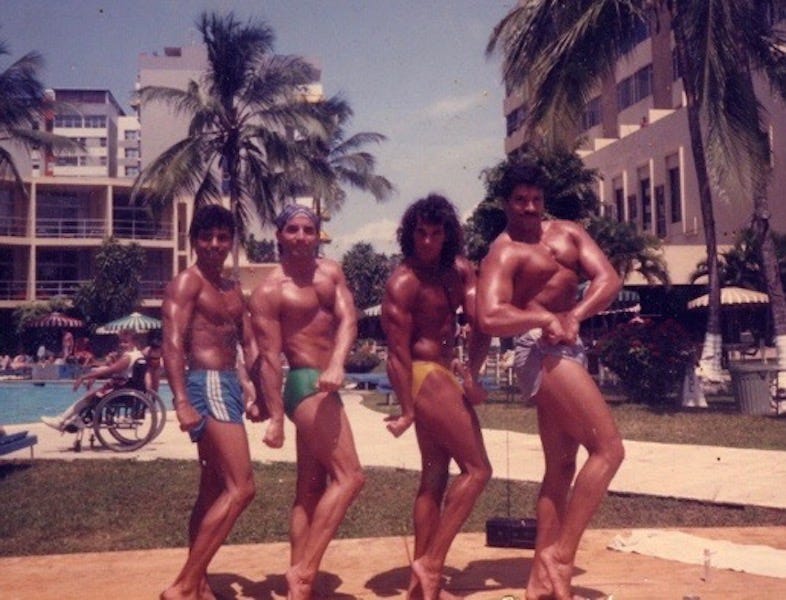That time I, um... redistributed some wealth
In its heyday, The Vertical Club (VC) was Manhattan’s ritziest health club — sort of Studio 54 meets Gold’s Gym. It was my first gym job and I’ve often joked that instead of going to college, I got a Ph.D. degree in Reality at the VC. The Big Apple’s wealthiest and most famous inhabitants sweat and strained and strutted and preened under the glow of neon lights, to the sound of throbbing club music.
From Sly Stallone to Bianca Jagger, Reggie Jackson to Liza Minelli, Martina Navratilova to Harrison Ford — plus movers and shakers from worlds of finance, real estate, advertising, law, and more. Meanwhile, the gym instructors were earning minimum wage. Why did we tolerate the low salary? A few reasons:
When you work for a gym, you get to use it as if you were a member. The VC had several floors of state-of-the-art equipment.
If you were trying to “make it” in any creative field, this is where you could meet the contacts you needed. If you were hoping to marry rich, well… I saw that happen more than once.
Getting to know the beautiful people led to us being invited to swanky events and into the hottest clubs — without ever having to wait in line.
Also, there were all those filthy rich OTB clients.
OTB = off-the-books. If you sign up for personal training sessions at a gym, management usually gets around 60 percent of the cut (if not more). Thus, in gyms everywhere, for as long as the concept has existed, trainers work with some official clients but make the bulk of their income with OTBs.
If a member pays the club $100 for an hour session, I may only get $45. So, I tell the client to pay me cash: $75 for the covert session. They save $25 and I earn an extra $30… tax-free. This is the standard operating procedure in the business.
Back to the VC: I started as a lowly gym instructor, supplemented my income with OTBs, and honed my skills — as a trainer and as a leader. Case in point: We had a trainer on staff named James. He had an extensive background in competitive gymnastics and was now transitioning into a new career. James was a take-no-shit kind of guy and this ended up getting him fired — without proper cause — when he wouldn’t back down to the VC president, Tommy D.
Tommy D. looked and acted like an extra in Goodfellas but it was more bluster than reality. When some genuine made men took over the pizzeria around the corner from the VC, they made Tommy cower. Even so, he ruled the VC with an iron fist and often fired employees on a whim. When he and James crossed swords, James was instantly canned.
Word of the firing reached the second-floor gym and I was incensed. Calmly, I walked around the cavernous facility and asked all my co-workers if they’d join me in a walkout. I’m nothing if not persuasive and only one trainer (a dude we called Spike) turned me down.
I brought my gang of mutineers to Manny, the gym-floor manager, and explained: “Because James was fired without proper cause, we’re all quitting right now — just before prime time.” Prime time is usually about 5 PM to 8 PM when most gyms are jam-packed with the after-work crowd. If we left, the VC was screwed.
Manny saw we were serious and asked me for five minutes while he spoke with Tommy. I’m not sure what was said, but James was re-hired on the spot and we all returned to our stations before the hordes of fitness fanatics arrived. In case it isn’t obvious, this is precisely the type of episode that gets a team of trainers wanting you to represent them in management.

I resisted for a long time but when I was offered a decent raise and an assistant manager title, I finally accepted. Manny was still in charge at the time and I became one of about five of his assistants. My first-ever team meeting with Tommy D. was the stuff of legends. He loved the sound of his own voice and went off on a rant about how unmotivated the training staff appeared. Not knowing that it was verboten to speak up, I immediately offered some input.
“Well,” I told Tommy, “we’re all underpaid and we don’t even have a proper employee lounge. I’m sure the morale would rise if we offered the trainers a few perks.” Tommy stared at me incredulously and then switched his gaze to Manny. “Whose idea was it to promote Mickey?” he asked, half-joking, before launching into his retort.
“You wanna know something?” he began. “Lemme tell you something.” (That was his standard opening, regardless of the topic.) “I believe in the carrot and stick. If we give the workers too much, they’ll just get lazy. I want them to compete with each other to become the best trainers and only the best trainers get a raise. Maybe.” I went to reply as my fellow managers cringed, but Tommy cut me off. “Think of the trainers as running a race. If one of them falls, the rest should step over him and keep going.”
“Can I reply now?” I asked. Tommy looked again at Manny with an expression that said, “Where did you find this guy?” Then he nodded to me and I countered: “If I’m doing anything — running a race or just walking down the street — and one of my teammates falls or anyone falls for that matter, do you know what I do?” Nobody answered my somewhat hypothetical question. “I stop and make sure they’re okay and I help them up.”
Tommy was far too astonished and amused to fire me on the spot. He deftly maneuvered to other topics but word of the meeting trickled up to the gym floor — further cementing my status amongst the peons. Thus, when Manny was eventually (and justifiably) fired, I was the natural choice to become the boss of the gym floor.
In a flash, I was hiring and training new instructors. I was also managing the housekeeping staff. This group of young male porters — mostly Central American, mostly from Honduras — became close with me. I helped them with their schoolwork, taught them crucial (and sometimes comical) phrases in English, and helped teach a couple of them how to become personal trainers and thus move up the health club ladder.
Also, in a flash, I realized that working in a gym had become way less fun. But I liked the increased income and stuck it out for a while.
The clientele was elite, as mentioned above — finance millionaires who arrived via limousine, legit billionaires (like Random House’s S.I. Newhouse) who trained in the quiet mid-morning hours, and world-renowned, A-List celebrities and athletes. They all got to know me and trusted me as the boss while my staff came to appreciate that I never backed down from these alleged big shots.
We had a no-tank-top rule and it was me who told Arnold himself that he had to wear a shirt with sleeves. Also, when Clint Eastwood decided to walk backward on the old-fashioned Stairmaster (another no-no), yours truly got Dirty Harry to do the right thing. I guess my Ph.D. was in both Reality and Leadership.
This finally brings me to my Robin Hood act.
Another of my managerial duties was compiling a weekly payroll. Anyway who knows me is aware of my meticulous nature and can thus attest that I would always make sure my staff’s paychecks were “correct.”
The statute of limitations has long run out on this confession so, here goes: In the pre-internet/cloud days of yore, it wasn’t too hard to give out, um… bonuses if any of my trainer or porter crew was in dire straits.
With a few strokes of my pen, I could help working-class folks pay an overdue bill, afford tuition, and even help bring family members over to a better life in the States. It was also my way of saying thank you to anyone on my staff who went above and beyond in any way.
But my “steal from the rich, give to the poor” schtick was not without some arbitrary personal conditions. When paychecks arrived each Thursday, I would carry them around with me and hand ‘em out whenever I encountered an employee. If I knew that particular worker had received a bonus, I’d covertly watch their reaction as they tore open the envelope. Eyes widen, then dart around. Facial expression blends joy and nervousness. What they did next was crucial.
If they kept the windfall to themselves, I’d never bring it up but also would probably never give them another bonus (barring something urgent). However, if they discreetly pulled me aside to point out the accounting error, I’d always respond with the same exact line: “I’ve never made a mistake on the payroll in my life and I never will.” That person would remain eligible for future stimulus payments.
As you might imagine, my staff would’ve run through a wall for me. There were times when members would start a fight and I would call out to the team. Before you could say “solidarity,” a brawny crew of male and female trainers in matching uniforms would swarm the scene. Problem. Instantly. Solved. In the end, however, I moved on and would never again take on such responsibilities at a gig. I learned that I was not cut out to be a boss for several reasons, e.g.
I was too nice. Firing someone felt like torture and it soon became impossible for me to control the OTBs. My team was often too occupied with running their cash-only business to fulfill their actual duties. You can guess who picked up the slack. This brings me to…
I can be a control freak. My brain will not let me delegate a task when I am certain I can do it better. Eventually, your staff figures this out. They consciously or unconsciously slack off, making it less likely you will ever ask them to step up again.
Most importantly, I’ve always been a lone wolf. I started working in gyms because I loved working out and helping people get healthy. It’s like running your own small business inside a large business. A gym manager, however, deals with fights, clogged toilets, workers who call in sick at the last minute, etc. Similarly, when I’ve tried my hand at running and editing magazines, websites, etc. I liked it in the beginning. Eventually, the bureaucracy dragged me further and further away from doing what I love: writing.
In other words, I could be in some kind of leadership job role somewhere right now. But, other than the extra income, my quality of life would be severely diminished.
Besides, as the Motorcycle Boy (a character in one of my favorite movies, Rumble Fish) puts it: “If you're going to lead people, you have to have somewhere to go.”
I may not have “somewhere to go” but, from experience, I can recommend: Being authentic, defending some rules while breaking others, and always protecting the vulnerable.






My esteem for you grows. No one can ever say you haven't really lived.
Throwing high society under the bus!